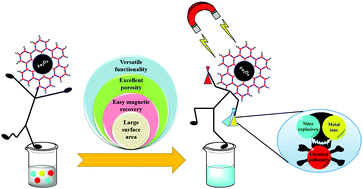Chemistry of magnetic covalent organic frameworks (MagCOFs): from synthesis to separation applications
Abstract
Magnetic covalent organic frameworks (MagCOFs) represent a new class of emerging material, primarily employed in separation applications. Due to their attractive properties such as easy and cost-effective synthesis, high porosity, large surface area, strong π–π interactions between COF shells and facile magnetic recovery, MagCOFs are being widely deployed in adsorption applications and exhibited high adsorption performance. This review emphasizes on the key advancements in the synthesis of MagCOFs and documents their potential in diverse separation applications including nitro explosive treatment, heavy metal ion adsorption and extraction of persistent organic pollutants, poly aromatic hydrocarbons and endocrine-disrupting chemicals, among others. In addition to offering up-to-date research outcomes in the field of separation science by utilizing MagCOFs, this article also highlights the challenges and possible solutions in this exciting developing area of research.

- This article is part of the themed collection: Recent Review Articles


 Please wait while we load your content...
Please wait while we load your content...